The text is a critique of an article from the Interdisciplinary Journal Of ?ontemporary Research In Business (JANUARY 2012, Vol3, No.9), focusing on the topics of leadership and management. It explores the professional, ethical, and philosophical elements related to management principles. The paper includes quotes and discussions from various authors and researchers regarding the concept of "Authentic Leadership". It also delves into the cultural differences in management expectations across different sections.
Within this journal, there are three main sections: Specifications of Leadership, Intercultural Leadership Contingency model, and Managerial Work and Leadership. The question arises: Does culture influence management expectations, and if so, how different are they? Furthermore, the actual role of a manager is explored along with their tasks and how they may be fragmented.
Summary:
The Gallup Leadership Institute (GLI) Summit took place in Omaha, Nebraska in June 2004. Scholars and practit
...ioners were invited to submit manuscripts on the emergence and development of authentic leadership. Although the definition of authentic leadership varies across the chosen articles, most of them emphasize the importance of individual leadership. An authentic leader possesses a deep understanding of how organizations operate and effortlessly resolves any arising issues (Luthans & Avolio, 2003).
The role of a leader involves motivating associates to work enthusiastically and ultimately increase productivity. Additionally, leaders inspire their followers through their own methods. There are various definitions of an authentic leader found in selected papers, which categorize their role into either task-oriented leadership or people-oriented leadership.
Task-oriented leadership involves focusing on tasks such as planning, scheduling, and giving instructions for completing those tasks. On the other hand, people-oriented leadership aims to create an optimal work environment for employees and also addresses thei
personal concerns. Additionally, different nations have varying expectations of their leaders. For example, Japanese individuals anticipate leaders to possess knowledge related to their work, whereas Americans expect leaders to assist them in finding solutions. The Intercultural Leadership Contingency model is a suitable framework for leadership in around 18 countries. This model categorizes leadership into four types: Directional Leadership, Supportive Leadership, Participatory Leadership, and Success-oriented Leadership.
The importance of culture on leadership is significant. An example of this is how Americans see the CEO as their role model, whereas the Chinese look up to the head of their family as their role model. Carlson emphasizes that when discussing managerial work and leadership, managers have many issues to address. Over many years, it has been confirmed that managers spend approximately 10 minutes on each issue. Carlson concludes that better time management can improve highly fragmented managerial work. Various researchers, such as Gulick and Urwick with their POSDCORB framework (planning, organizing, staffing, directing, co-ordinating, reporting, and budgeting), along with Snyder and Glueck, have conducted similar studies.
The text discusses the significance of leadership in a managerial role, highlighting that true leadership ability is demonstrated when a manager has a clear vision rather than solely focusing on strategies to accomplish tasks.
Critique:
The article provides a thorough analysis of the importance of leadership within an organization. It examines multiple research studies on managerial roles and considers all aspects of their feasibility.
The text provided presents a discussion on the definition of authentic leadership by different scholars, as well as examines the influence of culture on a leader's role and showcases research conducted on leadership. It concludes that there is no universal theory applicable to
all regions, which is an accurate observation. The author's objective was to establish a theory that avoids providing a general solution. To summarize, the analysis of various viewpoints is commendable, and the impartial conclusion is noteworthy. This paper serves as a foundation and reference for future research in this area.
- Being A Leader essays
- Servant Leadership essays
- Leadership Experience essays
- Leadership Qualities essays
- Age Of Enlightenment essays
- Ethos essays
- Time essays
- Acceptance essays
- Meaning Of Life essays
- Reality essays
- Natural Law essays
- Political Philosophy essays
- Utilitarianism essays
- Existence essays
- Free Will essays
- Good And Evil essays
- Confucianism essays
- Relativism essays
- Conscience essays
- Environmentalism essays
- Empiricism essays
- Epistemology essays
- Ethics essays
- Existentialism essays
- Human Nature essays
- Individualism essays
- Metaphysics essays
- Philosophy Of Life essays
- Transcendentalism essays
- Truth essays
- Destiny essays
- Determinism essays
- Fate essays
- Functionalism essays
- Philosophers essays
- Pragmatism essays
- Future essays
- Child Observation essays
- Critical Reflection essays
- Teaching Philosophy essays
- Personal Philosophy essays
- Action Speak Louder Than Words essays
- Can Money Buy Happiness essays
- Values of Life essays
- Ethical dilemma essays
- Normative Ethics essays
- Virtue Ethics essays
- Belief essays
- Deontology essays
- Moral essays




